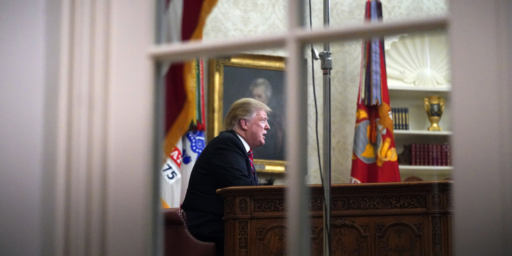Democrats Increasingly Frustrated with Congress
It turns out a 51-50 Senate majority isn't enough.

A new Gallup poll shows President Biden remains quite popular, at least given the polarized political climate, while Congress is down even from a pitiful starting point. Looking inside the numbers, it’s mostly Democrats who have become disillusioned by the inability of a Congress nominally controlled by Democrats to get anything done.
Fifty-six percent of Americans approve of the job President Joe Biden is doing overall, essentially unchanged from 54% in May. Biden’s approval rating has averaged 56% since he took office, with his monthly approval ratings straying no more than two percentage points from that level.
The June 1-18 poll was partially conducted while Biden met with world leaders in Europe on his first foreign trip as president, from June 9-16.
According to the poll, Biden enjoys nearly universal approval from Democrats (95%) as well as from a solid majority of independents (55%), versus 11% of Republicans. His rating also features a significant gender gap, with 65% of women versus 47% of men approving. That gap is similar to the gender pattern in Biden’s ratings all year and is the reverse of the gender gap under President Donald Trump, who earned higher support from men than women.
The racial gap in Biden’s ratings is even wider than the gender gap, with 74% of non-White Americans versus 48% of White Americans approving. At the same time, Biden receives approval from majorities of all major age and household income groups.
Gallup’s topline is slightly higher than the RealClearPolitics average of 52.3% but it’s nonetheless remarkable when one considers that former President Donald Trump didn’t spend a minute above 48% in his four-year term and was in fact underwater all but the first two or three days.
But the real story is Congress:
While Americans’ support for Biden is holding firm, their approval of Congress slipped to 26% this month, from 31% in May. It is now 10 points below this year’s high of 36% recorded in March, around the time Congress passed the largely popular CARES Act, which provided $1.9 trillion in new COVID-19 economic relief.
The mechanics of the recent decline in congressional approval are clear, as support fell sharply among Democrats, to 38%, down from 54% last month.
Democrats’ approval of the job Congress is doing had doubled between January and February, as their party effectively took full control in Washington, D.C., following Democratic victories in two U.S. Senate runoff elections in Georgia, and after Biden was sworn in as president. Approval from political independents was also slightly elevated at that time.
However, after remaining fairly high from March through May, Democrats’ support for Congress has plunged between May and June after Congress failed to pass an infrastructure package, which had been Biden’s legislative priority this spring.
The abrupt shift in Democrats’ views of the Democratic-controlled Congress echoes what occurred with Republicans in 2017 after the then-Republican-led Congress failed to make good on Trump’s directive to repeal and replace the Affordable Care Act. After rising from 20% in January of that year to 50% in February, Republicans’ approval of Congress sank to 28% by May and 16% by August, spanning several unsuccessful attempts to pass a repeal bill.
The inability of Congress to do much of anything, largely because of the de facto 60-vote threshold to pass most bills through the Senate, is well-known by most OTB readers, not least because Steven Taylor and I have beaten the topic like a rented mule. But most Americans spend far less time reading and thinking about politics and are like Charlie Brown, continually shocked when the football is snatched away at the last minute by his nemesis.
Rather than blame Lucy for her cruelty, though, most blame Chuck for falling for the trick yet again. And maybe that’s right. Certainly, Jamelle Bouie does. In his latest NYT column, “Democrats Should Act as if They Won the Election,” he blames the majority party for failing to do what’s necessary to get their agenda passed—namely, ending the filibuster.
We don’t need to rehash the argument as to why that would be good for democracy here, having made it so frequently of late. But, while my initial instinct was that it’s weird to blame Democrats for rules that have been in place for decades, he points out that, when routinely stymied by Dixiecrats in the early 1960s, House Speaker Sam Rayburn ruthlessly employed the tools at his disposal to pack the offending committee with more sympathetic members. But things were different:
In 1961, the prospect of gridlock and the possibilities opened up by a new administration motivated a coalition of liberals and moderates to change the rules and clear a path that would, in just a few short years, allow Congress to pass some of the most important legislation in its history.
Today, liberals see the opportunity of the moment. But moderates don’t appear to be frustrated enough with gridlock and inaction to change the rules of the chamber.
That’s right, I think. Partly, it’s genuine sentimentality for a Washington that hasn’t existed in a quarter-century, if it ever did. Partly, though, it’s a function of not being on board with the policy preferences of the party leadership.
Bouie’s final prediction, though, assumes that the voters are paying more attention than they are:
The first step toward victory is a government that can act. So, sure, moderate Democrats can keep the filibuster if they want. But they should prepare for when the voting public decides it would rather have the party that promises nothing and does nothing than the one that promises quite a bit but won’t work to make any of it a reality.
Democrats are likely to lose seats in 2022 because the President’s party almost always does. And because Republicans will disproportionately be drawing the House districts after a Census in which Republican-leaning states gained seats. And because Democrats have more vulnerable Senate seats.
I doubt that failing to get popular legislation passed because Republicans filibustered will do much to increase support for Republicans. But it’s possible, indeed, that Democrats will be less enthusiastic about showing up to the polls if they think their polices won’t get enacted regardless of the outcome.






I was thinking about how to bend the stalemate between the parties the other day and it struck me that the center of gravity for why the Republican party continues down the “hate democracy” path is donors. They are still raising crap loads of money.
If I were Bidens team (and Im still convinced someone in his orbit lurks this blog) I use the IRS to gain leverage over these people. This happens all the time by Republicans against professional organizations that donate to Democrats…like Teachers Unions.
Increase the size of the IRS 300% and turn the dogs loose. You want those teeth outta your ass? Make that check out to St Jude rather than Josh Hawley. Unfortunately someone is going have to get a little dirty to change the momentum. Congress cannot fix itself…it needs help.
I’m sure large numbers of people don’t know about or understand the filibuster, and I dare say most people don’t. Nor the exceptions that are possible to bypass it, like budget reconciliation, or cabinet and judicial confirmations.
What most people do know, is that the Democrats have the majority and do not manage to get any significant legislation passed. This can have the effect of lowering the blue turnout, and of switching some to vote Republican.
When you consider how frustrated civil rights activists were toward the Kennedy Administration and party leadership, this strikes me as a good example of looking at the past through rose-colored lenses.
Also, that phrase “a few short years” (“a coalition of liberals and moderates to change the rules and clear a path that would, in just a few short years, allow Congress to pass some of the most important legislation in its history”) is doing a lot of work for Bouie. Quite a bit happened in those few short years to unexpectedly put the party in a stronger position.
In some ways the comparison between Congresses then and now is apples to oranges, but there are a few things to keep in mind–among them that the threshold for cloture was higher than it is today (67 Senators instead of 60), and in 1961 the prospects for passing significant civil rights seemed to a lot of people to face near impossible odds.
It seems to me that if you are going to stick to the current rules and if Mitch McConnell and gang is going to obstruct everything just because they can, then it is incumbent on the Democrats to up the pain level of that obstruction. Like real filibustering. Like cancelling the 3 day work week, cancelling all the week long breaks. Like real investigations and subpoenas. It seems as though no one wants to be inconvenienced and that should end.
Somebody stole my Lucy and Charlie Brown analogy.
@de stijl: This is what I came up with the other day to express how I saw the situation.
@Scott:
Completely agree. If anyone wants to filibuster, they should have to be up there doing it the old way – holding the floor, no water, no bathroom breaks, speaking until they drop – to do it.
Here’s a thought experiment.
Now, I may have this all wrong, but my understanding is that legislation can originate either in the Senate of the House, If I’m wrong, the following makes no sense:
Strike the filibuster for legislation that originates in the House, and keep it as is only for legislation that originates in the Senate.
Of course, it will be gamed at once. Like Mitch putting together bills he has no intention of passing, but which get ahead of House bills under debate.
@Kathy:
Which is exactly Moscow Mitch’s plan. Approved by Mitch’s funders, the guys @Jim Brown 32: talks about. Same plan they applied through Obama’s presidency.
The salient bit of my original Lucy / Charlie Brown analogy is that Lucy is an obvious sociopath who delights in malicious cruelty and Charlie is a naive fool.
Charlie is never, ever gonna kick that football.
@de stijl:
One wonders how Lucy kept her medical license. But it’s clear why Charlie Brown kept seeking her psychiatric advice.
@Scott:
That’s because they don’t and think it shouldn’t. It’s only politics on Capital Hill; why would they get worked up over something as trivial as serving the needs of the citizenry? (And who needs rights that doesn’t have them anyway?)
@HarvardLaw92: Agreed.
Blocking legislation in the Senate shouldn’t be easier than voting is for black people in Georgia.
@Kylopod: Not to mention, it is telling that the example of leadership beating back minority opposition is from the House, not the Senate.